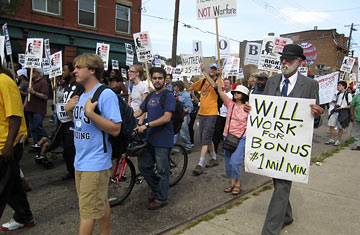
Protesters call on global leaders to do more to create jobs in the U.S. and around the world at a peaceful march in Pittsburgh, Pa.
The anarchists came to Pittsburgh to prepare to disrupt the G-20 summit. They quickly saw signs that made them believe that someone, or some entity, was prepared for them too. "Obviously, repression has already started," Pittsburgh anarchist Alex Bradley told a gathering of anti-authoritarians — the Pittsburgh G-20 Resistance Project — in a closed-door meeting on Sept. 20. Members of the group say they have been followed, photographed, stopped and searched in the run-up to their protests of the Group of 20 meeting of the world's leading economic powers on Sept. 24 and 25. The 40 people in the room were urged to write local lawyers' phone numbers on their bodies in case of arrest.
"When these events happen, there's a huge amount of propaganda that goes out from the state," Bradley told the group. "So a huge part of our effort was to reach out to people. People out there are angry, and they're angry about the same issues you're angry about." He was referring to G-20 globalization policies that he says take advantage of the cheapest labor markets and most vulnerable environments, which are running roughshod, in the anarchists' view, over the 6.7 billion people not invited to this week's meeting.
The Resistance Project has announced a Sept. 24 march on the downtown summit site, the David L. Lawrence Convention Center, as well as scattered actions by smaller groups on Sept. 25. Resistance has kept its numbers and the makeup of its alliance a secret; it has also kept mum about the specific actions that are planned for Friday's big protest. Unlike the 11 other organizations (led by the Thomas Merton Center’s Anti-War Committee, Three Rivers Climate Convergence and the local chapter of Codepink) hitting the streets, the Resistance Project has actively avoided applying for a city permit to protest and is likely to meet, in turn, resistance from law enforcement.
One thing they probably won't encounter are citizens. Fear of protesters is the talk of grocery and bank lines. At one point, local media were filled with reports of surreptitious foreigners training in a vacant building (they turned out to be a Swedish punk band on tour). For the duration of the summit, most locals are clearing out. School districts 10 miles away from downtown have canceled classes. Even before the Secret Service announced its security perimeters, businesses blocks away decided to shut down or arrange for workers to telecommute. Several storefronts have already been boarded up. And one downtown apartment-building owner advertised in Craigslist for ex-military personnel to man fire hoses to guard against protest-related vandalism.
With so much public anxiety, the city hasn't hidden its preparations against the protests. Since the White House's selection of Pittsburgh in May as the site for the summit, the city has said it is readying up to 1,000 jail cells for protesters, importing 3,100 law-enforcement officers from around the country to supplement its 900-member force and mobilizing 2,000 National Guard troops. The city council passed new laws (set to expire on Sept. 30) targeting the possession of certain tools and "noxious substances" — items allegedly thrown or used to blockade space at protests elsewhere.
The city's preparations haven't gone unchallenged. The American Civil Liberties Union has sued Pittsburgh over the police treatment of a Montana-based organization, Seeds of Peace Collective, which set up mobile kitchens and delivery trucks to feed protesters for free. The ACLU alleges that police hounded the collective from one neighborhood to the next with a series of petty charges. While ACLU lawyers failed to stop police action against the group, they did successfully sue to open Pittsburgh's iconic Point State Park to groups advocating action on climate change and women's rights.
